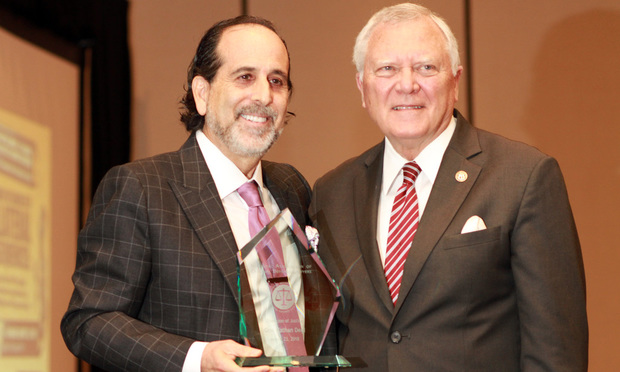Deal Highlights Prison Reforms for Criminal Defense Lawyers
NACDL President Drew Findling gave Gov. Nathan Deal a “Champion of Justice Restoration of Rights Award” for efforts in criminal justice reform. “I'm simply saying that it works,” Deal said.
August 24, 2018 at 11:37 AM
6 minute read
 Drew Findling (left), president of NACDL, presents the Champion of Justice Restoration of Rights Award to Gov. Nathan Deal at the 17th Annual State Criminal Justice Network Conference in Atlanta. (Photo: John Disney/ALM)
Drew Findling (left), president of NACDL, presents the Champion of Justice Restoration of Rights Award to Gov. Nathan Deal at the 17th Annual State Criminal Justice Network Conference in Atlanta. (Photo: John Disney/ALM)
States that want to cut costs and repeat stays in their prisons need to remove the traps that make people return, Gov. Nathan Deal told the National Association of Criminal Defense Lawyers in a packed grand ballroom at the Marriott Marquis in downtown Atlanta Thursday.
NACDL's conference focus this year is “shattering the shackles of collateral consequences” for people who've served their sentences and returned to society.
Deal urged the lawyers to take home the keys to Georgia's success story: addiction and mental health treatment courts to keep people out of prison, high school and trade skill classes for those in prison, and job and housing options for when they come out.
The group's president, Drew Findling of the Findling Law Firm in Atlanta, gave Deal a “Champion of Justice Restoration of Rights Award” for the governor's efforts in criminal justice reform.
“I'm simply saying that it works,” Deal said. He drew applause when he told the group that Georgia had reversed a long trend of growing prison beds and costs and talked about how that happened.
“Accountability courts are one of the best tools,” Deal said. But he admitted that when he first took office nearly eight years ago, the idea was not popular with judges or prosecutors.
“It's easier to sit behind a bench in a robe and send people to jail than to be responsible for a drug court,” Deal said. The duties include supervision of the participants, weekly sessions to check their progress and offer motivation, hours of additional collaboration with counselors, addiction specialists, social workers and prosecutors.
So the first order of business was to offer motivation for the judges. For Georgia, that was a pay boost of $6,000 a year. Deal said that goes to every judge in a circuit that has an accountability court.
“You don't even have to preside over it. You just have to have one in your circuit,” he said. “I'm proud to tell you that every circuit in Georgia now has at least one, and I'm hoping to see that number increase.”
Deal said he makes that treatment philosophy clear in his judicial appointments. “I've had the opportunity to appoint more judges than any other governor in the state of Georgia,” Deal said. “I assure you I'm making sure they understand this is an important public policy issue.”
Deal said this growing crop of accountability courts has boosted the state's economy at the rate of $38.7 million per year “because they are working and not in prison.” He added, “That is not an insignificant number.”
Deal said he likes to illustrate his points with stories, and he told one about the rural area where he and his wife live when they're not in the Governor's Mansion on West Paces Ferry Road in Atlanta—and where they plan to retire after he leaves office.
The Deals have what he calls a log home on the banks of the Chattahoochee River in Habersham County on the edge of the Appalachian Mountains and just north of Gainesville.
“My wife is not sophisticated in her shopping tastes,” he said. “And I like down-home cooking.”
When the first couple are out and about in the North Georgia mountains, people approach them to talk about accountability courts. But it's not the governor's efforts they praise. It's those of his son, Judge Jason Deal, who presides over drug courts in Hall and Dawson counties—and who was doing that work even before the father became governor.
“People come up to us and say, 'I have been in or graduated from your son's drug court,'” Deal said. The governor said his first reaction was to be shocked that people would admit that in public.
“But then they would rapidly say, 'It saved my life,'” he said. “They weren't ashamed of that fact. They were proud of it.”
And for those who have graduated from a drug court, the recidivism rate is 2 percent, Deal said, drawing applause.
Later efforts in criminal justice reform focused on offering inmates classes to earn high school diplomas as well as technical skills. He noted his early observation as governor looking for the common denominator in Georgia's crowded prisons: 70 percent did not finish high school.
“My view is education reform is the greatest criminal justice reform,” Deal said. More applause. Deal said earning a high school diploma in prison has reduced recidivism by 19 percent. Adding trade skills has decreased it by 24 percent.
But the key there is providing a path to jobs, and that requires “banning the box,” Deal said, referring to the box on employment applications that must be checked for those who've been convicted of a crime.
So the state started with offering everyone an opportunity to at least be considered for public jobs. Later, private employers began to follow. Deal praise the Blue Bird bus company for leading that movement, desperate for workers with welding skills and willing to take on those who learned them in prison.
“Quite honestly, a good economy encourages that. They need workers,” Deal said.
Housing is another obstacle. Deal said he has been pushing Housing and Urban Development Secretary Ben Carson to set aside “slots in public housing allocated for returning citizens.” The Georgia Criminal Justice Reform Council has worked with housing agencies in the state toward the same goal, he said.
“Success breeds even more success, but you have to show you are not just talking,” Deal said. As an example, he said, most of the people who work at the Governor's Mansion are inmates living in a transition center. The night before, they had worked late to serve and clean up after a state banquet. The head chef is a former inmate now earning a culinary arts degree at a technical school.
“I and my wife have established friendships in that prison population that will be with us for the rest of our lives,” Deal said, his voice choking. “Success stories like that ought to cause everybody to cry.”
The defense lawyers responded with a standing ovation.
This content has been archived. It is available through our partners, LexisNexis® and Bloomberg Law.
To view this content, please continue to their sites.
Not a Lexis Subscriber?
Subscribe Now
Not a Bloomberg Law Subscriber?
Subscribe Now
NOT FOR REPRINT
© 2025 ALM Global, LLC, All Rights Reserved. Request academic re-use from www.copyright.com. All other uses, submit a request to [email protected]. For more information visit Asset & Logo Licensing.
You Might Like
View All
40% Contingency: A New Ruling Just Cost This Plaintiff Team $827K in Legal Fees
6 minute read
'David and Goliath' Dispute Between Software Developers Ends in $24M Settlement

Trending Stories
Who Got The Work
Michael G. Bongiorno, Andrew Scott Dulberg and Elizabeth E. Driscoll from Wilmer Cutler Pickering Hale and Dorr have stepped in to represent Symbotic Inc., an A.I.-enabled technology platform that focuses on increasing supply chain efficiency, and other defendants in a pending shareholder derivative lawsuit. The case, filed Oct. 2 in Massachusetts District Court by the Brown Law Firm on behalf of Stephen Austen, accuses certain officers and directors of misleading investors in regard to Symbotic's potential for margin growth by failing to disclose that the company was not equipped to timely deploy its systems or manage expenses through project delays. The case, assigned to U.S. District Judge Nathaniel M. Gorton, is 1:24-cv-12522, Austen v. Cohen et al.
Who Got The Work
Edmund Polubinski and Marie Killmond of Davis Polk & Wardwell have entered appearances for data platform software development company MongoDB and other defendants in a pending shareholder derivative lawsuit. The action, filed Oct. 7 in New York Southern District Court by the Brown Law Firm, accuses the company's directors and/or officers of falsely expressing confidence in the company’s restructuring of its sales incentive plan and downplaying the severity of decreases in its upfront commitments. The case is 1:24-cv-07594, Roy v. Ittycheria et al.
Who Got The Work
Amy O. Bruchs and Kurt F. Ellison of Michael Best & Friedrich have entered appearances for Epic Systems Corp. in a pending employment discrimination lawsuit. The suit was filed Sept. 7 in Wisconsin Western District Court by Levine Eisberner LLC and Siri & Glimstad on behalf of a project manager who claims that he was wrongfully terminated after applying for a religious exemption to the defendant's COVID-19 vaccine mandate. The case, assigned to U.S. Magistrate Judge Anita Marie Boor, is 3:24-cv-00630, Secker, Nathan v. Epic Systems Corporation.
Who Got The Work
David X. Sullivan, Thomas J. Finn and Gregory A. Hall from McCarter & English have entered appearances for Sunrun Installation Services in a pending civil rights lawsuit. The complaint was filed Sept. 4 in Connecticut District Court by attorney Robert M. Berke on behalf of former employee George Edward Steins, who was arrested and charged with employing an unregistered home improvement salesperson. The complaint alleges that had Sunrun informed the Connecticut Department of Consumer Protection that the plaintiff's employment had ended in 2017 and that he no longer held Sunrun's home improvement contractor license, he would not have been hit with charges, which were dismissed in May 2024. The case, assigned to U.S. District Judge Jeffrey A. Meyer, is 3:24-cv-01423, Steins v. Sunrun, Inc. et al.
Who Got The Work
Greenberg Traurig shareholder Joshua L. Raskin has entered an appearance for boohoo.com UK Ltd. in a pending patent infringement lawsuit. The suit, filed Sept. 3 in Texas Eastern District Court by Rozier Hardt McDonough on behalf of Alto Dynamics, asserts five patents related to an online shopping platform. The case, assigned to U.S. District Judge Rodney Gilstrap, is 2:24-cv-00719, Alto Dynamics, LLC v. boohoo.com UK Limited.
Featured Firms
Law Offices of Gary Martin Hays & Associates, P.C.
(470) 294-1674
Law Offices of Mark E. Salomone
(857) 444-6468
Smith & Hassler
(713) 739-1250







